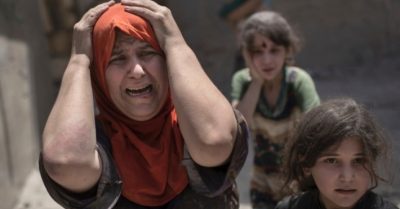Destroying Mosul to Save It: Possible US-Backed War Crimes in Iraq Exposed
As Trump applauds victory against ISIS in devastated Iraqi city, Amnesty International details horrific death toll and suffering of civilian population

Featured image: Thousands of Iraqi civilians have been killed in recent months by imprecise bombings by the U.S.-led coalition in Mosul. (Source: arif_shamim/Flickr/cc)
As Iraqi forces celebrate their victory over the Islamic State (ISIS) in Mosul, a damning new report by Amnesty International sheds light on the killing of Iraqi civilians at the hands of the U.S.-led coalition which “may constitute war crimes”—and demands that the coalition acknowledges the loss of civilian life and takes steps to lessen non-military casualties.
Thousands of civilians have been killed in Mosul and millions have been displaced since ISIS took control of the city in June 2014. The crimes of the group have been well documented by Amnesty International and other human rights groups. The report notes that ISIS deliberately put thousands of civilians in harm’s way, using them as human shields in the city’s conflict zones, and killing people who attempted to escape.
The report also focuses on the human cost of the U.S.-led coalition’s actions in Mosul. Amnesty interviewed 150 witnesses, experts and analysts about dozens of attacks, and focused on a pattern of attacks that took place between January and July 2017.
“The horrors that the people of Mosul have witnessed and the disregard for human life by all parties to this conflict must not go unpunished,” says Lynn Maalouf, Amnesty’s director of research for the Middle East. “Entire families have been wiped out, many of whom are still buried under the rubble today. The people of Mosul deserve to know, from their government, that there will be justice and reparation so that the harrowing impact of this operation is duly addressed.”
The coalition’s attacks were largely carried out with Improvised Rocket Assisted Munitions (IRAMs), explosives with unsophisticated targeting abilities, which “wreaked havoc in densely-populated west Mosul and took the lives of thousands of civilians,” according to the report. Air strikes by U.S. planes were also frequent during this time period, and the report says the coalition did little to protect civilians from these attacks.
“They did air-drop leaflets into [ISIS]-controlled areas of the city, instructing civilians to stay away from [ISIS] or to hang children’s clothes on the roof to mark civilian homes. These warnings, however, took little account of the realities of living under [ISIS]. Staying away from [ISIS] was impossible for west Mosul residents and fighters would execute anyone caught with a flyer in their hands. Houses with children’s clothes on the roof were still hit by air strikes.”
“ISIS’s use of people as human shields does not lessen the legal obligation of pro-government forces to protect civilians,” says Maalouf. “Military planners should have taken extra care in the manner in which they used their weapons to ensure that these attacks were not unlawful.”
Amnesty International is demanding that Iraqi forces and the U.S.-led coalition limit the use of IRAMs in the fight against ISIL; it says the weapons “should never be used in densely populated civilian areas.” It also joins other human rights groups in calling for an urgent increase in funding for humanitarian assistance for those who have fled the fighting in Mosul.
Mosul: “The fighting may be over, but the humanitarian crisis is not”#ChildrenUnderAttack need food, water, shelter & medicine @UNICEFiraq pic.twitter.com/c87i3f0G3o
— UNICEF (@UNICEF) July 10, 2017
The report also notes that the coalition must publicly acknowledge the human cost of the fighting in Mosul. In his official statement on the retaking of Mosul by the Iraqi forces, President Donald Trump made no mention of civilian deaths that resulted from coalition attacks, instead acknowledging only the Iraqis who have been killed and displaced by ISIS.
This work is licensed under a Creative Commons Attribution-Share Alike 3.0 License

